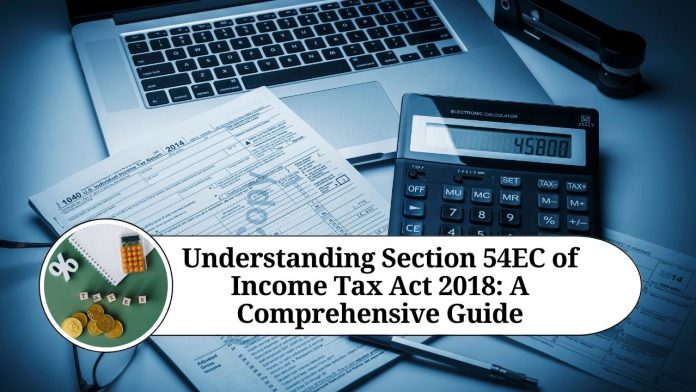Section 54EC of the Income Tax Act, 2018 provides for exemption from capital gains tax on the sale of specified assets, subject to certain conditions. This section was introduced to encourage investment in specified bonds and reduce the tax burden on taxpayers who sell long-term capital assets.
What is Section 54EC of Income Tax Act 2018?
Section 54EC provides for exemption from long-term capital gains tax on the sale of specified assets, which includes land, building, and other capital assets. To claim this exemption, the taxpayer must invest the capital gains arising from the sale of the specified asset in specified bonds within six months from the date of the sale.
Conditions for claiming exemption under Section 54EC:
To claim exemption under Section 54EC, the following conditions must be fulfilled:
- Only long-term capital gains are eligible for exemption.
- The sale must be of a specified asset, i.e., land, building, or any other capital asset.
- The proceeds from the sale of the specified asset must be invested in specified bonds within six months from the date of the sale.
- The investment in specified bonds must be made by the taxpayer, i.e., the individual or HUF who has earned the capital gains.
- The bonds must be issued by the National Highway Authority of India (NHAI) or the Rural Electrification Corporation (REC).
- The minimum lock-in period for the specified bonds is three years.
Exemption Limit:
The maximum exemption limit under Section 54EC is Rs. 50 lakh in a financial year. This means that if the capital gains from the sale of the specified asset are more than Rs. 50 lakh, the taxpayer can still claim exemption for up to Rs. 50 lakh, and the remaining amount will be taxable.
Advantages of Section 54EC:
The primary advantage of Section 54EC is that it allows taxpayers to save tax on long-term capital gains, which are typically subject to a higher tax rate than short-term capital gains. Additionally, the investment in specified bonds is relatively safe, as these bonds are issued by government-backed organizations like NHAI and REC. The minimum lock-in period of three years also ensures that taxpayers have a long-term investment that can provide a steady source of income.
Investment options under Section 54EC:
As per the Income Tax Act, NHAI and REC are the only two organizations authorized to issue specified bonds under Section 54EC. These bonds are typically issued in denominations of Rs. 10,000 and have a lock-in period of three years. The interest rate offered by these bonds may vary, but it is usually in the range of 5-6%.
Impact of Budget 2021 on Section 54EC:
In the Union Budget 2021, the government announced that the maximum investment limit for Section 54EC bonds would be increased from Rs. 50 lakh to Rs. 1 crore. This move was aimed at providing a larger tax-saving opportunity to taxpayers who sell long-term capital assets. Additionally, the government also extended the time limit for making investments in these bonds from six months to nine months.
Conclusion:
Section 54EC of the Income Tax Act, 2018 provides a valuable tax-saving opportunity for taxpayers who sell long-term capital assets. By investing the proceeds from the sale of the specified asset in specified bonds issued by NHAI or REC, taxpayers can reduce their tax liability and enjoy the benefits of long-term investments. However, it is important to ensure that all the conditions for claiming exemption are met to avoid any penalties or legal issues.
Read more useful content:
- section 145 of income tax act
- section 10e of income tax act
- section 9 of the income tax act
- section 94b of income tax act
- section 206aa of income tax act
Frequently Asked Questions (FAQs)
What is the minimum lock-in period for specified bonds under Section 54EC?
Ans: The minimum lock-in period for specified bonds under Section 54EC is three years.
Can the investment in specified bonds be made by someone other than the taxpayer?
Ans: No, the investment in specified bonds must be made by the taxpayer, i.e., the individual or HUF who has earned the capital gains.
Can the exemption under Section 54EC be claimed for short-term capital gains?
Ans: No, the exemption under Section 54EC can only be claimed for long-term capital gains.
What is the maximum exemption limit under Section 54EC?
Ans: The maximum exemption limit under Section 54EC is Rs. 50 lakh in a financial year.
Are there any penalties for non-compliance with the conditions of Section 54EC?
Ans: Yes, if the conditions of Section 54EC are not met, the exemption may be disallowed, and penalties may be imposed.
Can the exemption under Section 54EC be claimed multiple times in a financial year?
Ans: No, the exemption under Section 54EC can only be claimed once in a financial year.
Can the specified bonds be sold before the lock-in period expires?
Ans: No, the specified bonds cannot be sold before the lock-in period of three years expires.
Can the proceeds from the sale of a specified asset be invested in any other investment to claim tax exemption?
Ans: No, the proceeds from the sale of a specified asset must be invested in specified bonds issued by NHAI or REC to claim tax exemption under Section 54EC.
Is there any limit on the amount that can be invested in specified bonds under Section 54EC?
Ans: No, there is no limit on the amount that can be invested in specified bonds under Section 54EC, but the maximum exemption limit is Rs. 50 lakh.
Is Section 54EC applicable to all taxpayers?
Ans: Yes, Section 54EC is applicable to all taxpayers who sell long-term capital assets and meet the conditions for claiming exemption.




















